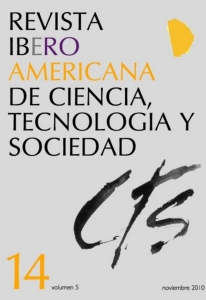Contributions to a Theory of Digital Democracy as Support for Public Policy Formulation
DOI:
https://doi.org/10.52712/issn.1850-0013-836Keywords:
online public consultations, digital democracy, science and technology public policiesAbstract
Under the realm of the Brazilian federal government, online public consultations have been expanded as a means of shared formulation of policies of many government sectors, especially science and technology. However, despite the fast multiplication of those instruments of political participation in the last few years, there can be resistances to their advance. So it is convenient to clarify the domain in which the strengthening of the electronic means of participation can be supported in the Latin American context. This paper proposes contributions to a theory of digital democracy which might sustain efforts to the development of that field. Attention is drawn to the political conception of justice according to Rawls and Habermas’ theory of discourse ethics, which can bear the notion that individuals and groups should, in liberal-democratic societies, cooperatively act in order to value their political liberty in agreements about goals and priorities of the manners of promoting justice and reducing inequalities.
Downloads
References
ARAÚJO, C. (2002): "Legitimidade, justiça e democracia: o novo contratualismo de Rawls", Lua Nova, n. 57, pp. 73-86.
BAKER, C. E. (2008): "Rawls, equality, and democracy", Philosophy & Social Criticism, vol. 34, n. 3, pp. 203-246.
BENKLER, Y. (2006): The wealth of networks: how social production transforms markets and freedom, New Haven e Londres, Yale University Press.
COLEMAN, J. S. (1998): "Social capital in the creation of human capital", The American Journal of Sociology, vol. 94, Supplement: Organizations and institutions: sociological and economic approaches to the analysis of social structure, pp. S95-S120.
COLEMAN, S. (2002): Hearing voices: the experience of online public consultations and discussions in UK governance, Londres, Hansard Society.
COLEMAN, S. (2004): "Connecting parliament to the public via the internet: two case studies of online consultations", Information, Communication & Society, v. 7, n° 1, pp. 1-22.
COLEMAN, S. e J. GØTZE (2002): Bowling together: online public engagement in public deliberation, Londres, Hansard Society.
DAHLBERG, L. (2001a): "Democracy via Cyberspace: Mapping the Rhetorics and Practices of Three Prominent Camps", New Media & Society, v. 3, n. 2, pp. 157-177.
DAHLBERG, L. (2001b): "The internet and democratic discourse: exploring the prospects of online deliberative forums extending the public sphere", Information, Communication & Society, v. 4, n° 4, pp. 615-633.
EISENBERG, J. e M. CEPIK (org.) (2002): Internet e política: teoria e prática da democracia eletrônica, Belo Horizonte, Editora UFMG.
GIMMLER, A. (2001): "Deliberative democracy, the public sphere and the internet", Philosophy & Social Criticism, v. 27, n. 4, pp. 21-39.
GOMES, W. (2005): “A democracia digital e o problema da participação civil na decisão política”, Fronteiras - Estudos Midiáticos, v. 7, n° 3, pp. 214-222.
HABERMAS, J. (1989): Consciência moral e agir comunicativo, Rio de Janeiro, Tempo Brasileiro.
HABERMAS, J. (1995): “Três modelos normativos de democracia”, Lua Nova, n. 36, pp. 39-53.
LAFONT, C. (2003): “Procedural justice?: Implications of the Rawls-Habermas debate for discourse ethics”, Philosophy & Social Criticism, v. 29, n. 2, pp. 163-181.
LÜCHMANN, L. H. H. (2007): “A representação no interior das experiências de participação”, Lua Nova, vol. 70, pp. 139-170.
MARQUES, F. P. J. A. (2006): “Debates políticos na internet: a perspectiva da conversação civil”, Opinião Pública, v. 12, n° 1, pp. 164-187.
OCDE (2003): Promise and problems of e-democracy: challenges of online citizen engagement, Paris, Organização para a Cooperação e Desenvolvimento Econômico.
POLAT, R. K. (2005): “The internet and political participation: exploring the explanatory links”, European Journal of Communication, v. 20, n. 4, pp. 435-459.
PUTNAM, R. D. (1995): “Tuning in, tuning out: the strange disappearance of social capital in América”, PS: Political Science and Politics, v. 28, n. 4, pp. 644-83.
PUTNAM, R. D. (1999): Comunidade e democracia: a experiência da Itália moderna, São Paulo, FVG.
RAWLS, J. (2000): Justiça e democracia, São Paulo, Martins Fontes.
REPÚBLICA FEDERATIVA DO BRASIL (2003): Governo eletrônico: princípios e diretrizes, Brasília, DF, disponível em: https://www.governoeletronico. gov.br/o-gov.br/principios. Acesso em: 4 nov. 2008.
REPÚBLICA FEDERATIVA DO BRASIL (2006): Consulta pública do Sistema Único de Saúde: Política Nacional de Gestão de Tecnologias em Saúde, Brasília, DF, disponível em: http://dtr2004.saude.gov.br/consulta publica/display/dsp_print_completo.php?d=1388. Acesso em: 4 nov. 2008.
ROTHBERG, D. (2005): “Mito, teorias da notícia e jornalismo sobre ciência”, Comunicação e Espaço Público (UnB), v. 5, pp. 71-84.
ROTHBERG, D. (2008): “Por uma agenda de pesquisa em democracia eletrônica”, Opinião Pública (Unicamp), v. 14, n. 1, pp. 149-172.
SILVEIRA, D. C. (2007): “Teoria da justiça de John Rawls: entre o liberalismo e o comunitarismo”, Trans/Form/Ação, v. 30, n. 1, pp. 169-190.
SOUSA, C. M., T. SILVEIRA e N. PERIÇO (2002): A comunicação pública da ciência, Taubaté, SP, Cabral.
UNITED KINGDOM. HOUSE OF COMMONS INFORMATION SELECT COMMITTEE (2002): Digital technology: working for parliament and the public, Londres.
VITA, Á. de (1999): “Uma concepção liberal-igualitária de justiça distributiva”, Revista Brasileira de Ciências Sociais, v. 14, n. 39, pp. 41-59.
WRIGHT, S. e J. STREET (2007): “Democracy, deliberation and design: the case of online discussion forums”, New Media & Society, v. 9, n. 5, pp. 849-869.
Downloads
Published
How to Cite
Issue
Section
License
Copyright (c) 2025 CC Attribution 4.0

This work is licensed under a Creative Commons Attribution 4.0 International License.
All CTS's issues and academic articles are under a CC-BY license.
Since 2007, CTS has provided open and free access to all its contents, including the complete archive of its quarterly edition and the different products presented in its electronic platform. This decision is based on the belief that offering free access to published materials helps to build a greater and better exchange of knowledge.
In turn, for the quarterly edition, CTS allows institutional and thematic repositories, as well as personal web pages, to self-archive articles in their post-print or editorial version, immediately after the publication of the final version of each issue and under the condition that a link to the original source will be incorporated into the self-archive.











